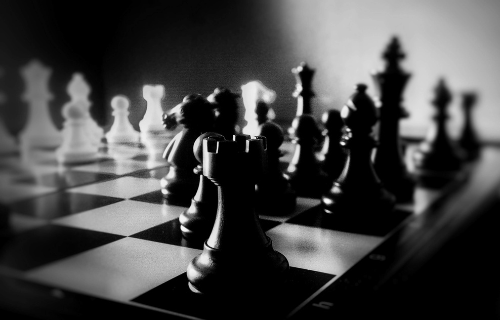 |
 |
Introduction
Chess, the timeless game of strategy and intellect, offers endless opportunities for growth and improvement. As an intermediate player, you've mastered the basics and are ready to delve deeper into the strategic aspects of the game. This guide will explore essential chess strategies to elevate your play, focusing on openings, mid-game tactics, and endgame techniques.
Understanding the Opening
The opening phase is crucial in setting the stage for the rest of the game. Here are key principles to consider:
1. Control the Center: Dominating the central squares (d4, d5, e4, e5) allows your pieces more mobility and better control of the board.
2. Develop Your Pieces: Move your knights and bishops early to active squares. Avoid moving the same piece multiple times unless necessary.
3. King Safety: Castle early to protect your king and connect your rooks, enhancing their activity.
Common Opening Systems:
- The Ruy-Lopez: A solid opening that emphasizes central control and piece development.
- The Sicilian Defense: A popular choice for counter-attacking and unbalancing the position.
- The Queen's Gambit: A classical opening aiming for central dominance and piece activity.
Mid-Game Tactics
Once the opening is complete, the mid-game is where tactics and strategy come into play. Key concepts include:
1. Piece Coordination: Ensure your pieces are working together, supporting each other, and controlling key squares.
2. Tactical Awareness: Look out for tactics such as forks, pins, skewers, and discovered attacks. These can turn the tide of the game.
3. Pawn Structure: Pay attention to your pawn formation. Weaknesses like isolated or doubled pawns can be exploited by your opponent.
Important Mid-Game Strategies:
- Control Open Files: Rooks are most effective on open files where they can exert pressure on the opponent's position.
- Use Outposts: Place knights on outposts (squares where they can't be easily attacked by pawns) to create long-term threats.
- Attack the King: Look for opportunities to launch an attack on the opponent's king, especially if their king is uncastled or their pawn structure is compromised.
Endgame Techniques
The endgame requires precision and a deep understanding of piece activity and pawn promotion. Key principles include:
1. King Activity: In the endgame, the king becomes an active piece. Use it to support your pawns and attack the opponent's pawns.
2. Pawn Promotion: Focus on promoting your pawns to queens. Coordinate your pieces to support this plan.
3. Piece Coordination: Even in the endgame, ensure your pieces are working together. Rook and pawn endgames, in particular, require careful coordination.
Essential Endgame Concepts:
- Opposition: A critical concept in king and pawn endgames. Gaining opposition allows you to control key squares and force the opponent's king to retreat.
- Lucena Position: A fundamental rook endgame position where the attacking side can force a pawn promotion.
- Philidor Position: A defensive technique in rook endgames to hold a draw against a stronger opponent.
Common Mistakes to Avoid
Improving as an intermediate player involves recognizing and avoiding common mistakes:
1. Neglecting Development: Don’t focus too much on pawns or a single piece. Ensure all your pieces are active.
2. Ignoring Opponent's Threats: Always consider your opponent's potential moves and threats before making a decision.
3. Overextending: Avoid pushing too many pawns or advancing pieces without adequate support, as it can create weaknesses in your position.
Study and Practice
Improvement in chess requires consistent study and practice. Here are some tips:
1. Analyze Your Games: Review your games to identify mistakes and understand where you can improve.
2. Solve Tactics Puzzles: Regularly solving tactics puzzles helps sharpen your tactical awareness.
3. Study Grandmaster Games: Analyzing games played by grandmasters can provide insight into advanced strategies and ideas.
Conclusion
Transitioning from a beginner to an intermediate chess player involves mastering essential strategies and continuously refining your skills. By focusing on openings, mid-game tactics, and endgame techniques, you can significantly improve your game. Remember to study, practice, and learn from your games to become a formidable chess player.
---
By implementing these strategies and dedicating time to study and practice, you'll find yourself making significant progress and enjoying the complexities of chess even more. Happy playing!